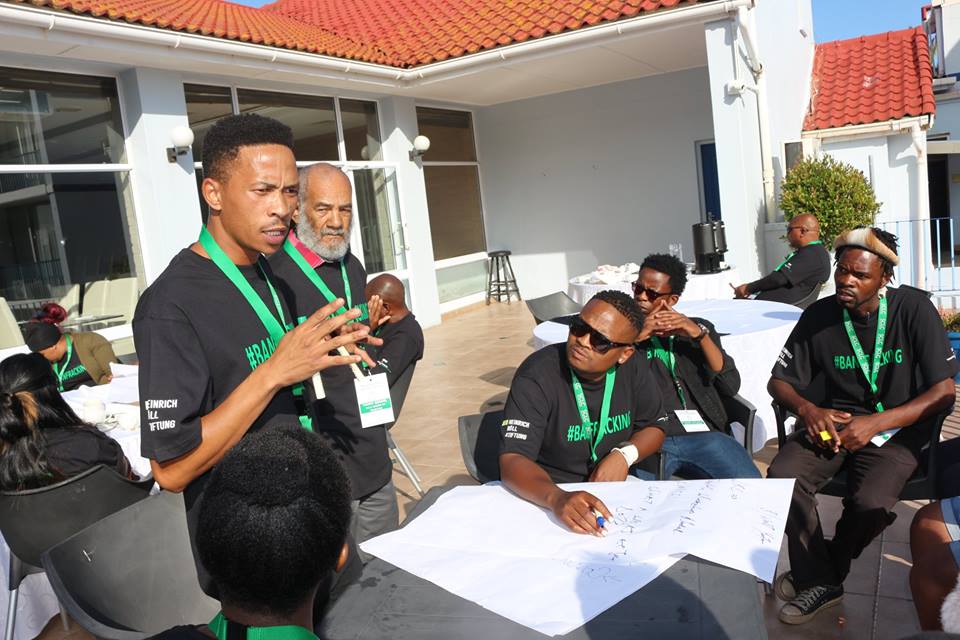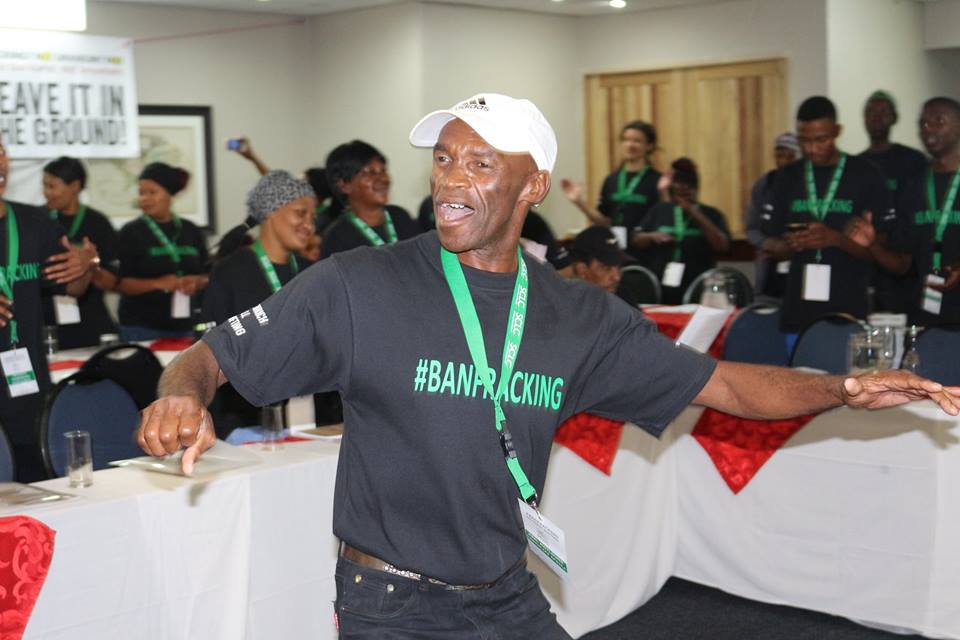Our Life, Our Water, Our Sea, Our Air, Our Land – Statement from the National Gasdown Frackdown Gathering South Africa October 2018
Over the past 3 days, we the community people representing traditional leaders, farm workers, farm dwellers, subsistence farmers, fisherfolk, and those from neighbourhoods affected by toxic pollution, together with people’s organisations and NGOs, gathered to reflect on the environmental, economic and political crisis our country and world presently finds itself in. This engagement afforded us an opportunity to thoughtfully consider our response to this crisis.

Our resistance to proposed fracking in South Africa, and the expansion of offshore oil and gas has brought us together. As a collective we are able to learn from our negative experiences of the corporate and political elite fossil fuel agenda and our successful resistance to this agenda in various parts of South Africa, and to build upon these initiatives, including:
- Black Thursday Land Campaign – Mawubuye umhlaba wethu which was clear: “Don’t Frack with The Karoo” in 2013 and 2015; and
- Matatiele Manifesto – Some for all, Forever! in 2016.
We recognise:
-
- that our resistance has faced many obstacles, especially the closing down of our democratic spaces and the outsourcing of our democracy to consultants and corporates, who define how decision-makers hear our voices;
-
- the absence of officials and political leadership at critical gatherings where community people raise their concerns against the expansion of the fossil fuel agenda, and thus ignore the legitimate voices of people. With community voices suppressed, they then depend on watered down and biased reports by industry and their cohort of consultants that push fossil fuels to the detriment of people and their environments;
-
- that corporates, their consultants and government fail to have ongoing meaningful dialogue with affected communities, and only come to people as a rubber-stamping exercise;
-
- the environmental crisis is best understood through global warming which is now at 1.2°C over pre-industrial (1750-1900 average). This is already dangerous and deadly climate change: people are experiencing extreme heat, drought, hurricanes and floods; people’s lives, water and land are being affected. The poorest people are suffering and will continue to suffer the most. We also recognise that in order to save our lives there can be no more increase in carbon emissions, and by 2040 there must be zero carbon emissions; time is already against us.
-
- the economic crisis, is a result of the SA and global economy being based on neoliberalism, which has failed society. South Africa’s economy is based upon the ‘Minerals Energy Complex’ (MEC) which shaped the country’s development for over a century and led to vast wealth accumulation for corporations but made most of the people poor and created the world’s most unequal society. Well over half of the people in South Africa are poor. In the townships of the Highveld, over 40% are unemployed. It is those in rural areas and urban townships that suffer the most. Despite this, government and corporates continue to push for gas on and off shore;
-
- the energy crisis the world is facing as we reach peak oil leads to the push by government towards false solutions such as gas, as a panacea to address people’s energy needs. And the elite supports this agenda, pushing gas forward as a ‘game changer’ and a ‘transition fuel’ to renewable energy. Based upon this, government seeks to convince the public falsely that gas is needed;
-
- that government’s draft Integrated Resource Plan for electricity (IRP 2018) enables continued pollution to harm people’s health, the environment and the climate system. Whereas greenhouse gas emissions must be reduced to zero by 2040 to avoid catastrophic climate change, the IRP assumes ongoing emissions from the power system to around 2080. It also recommends the inclusion of two new privatised coal-fired power stations which will increase overall costs to the people of South Africa; and further trap the poor into poverty
-
- the water crisis facing South Africa, and the impact of petroleum and mineral extraction on our critical water resources. In particular, we acknowledge the vital importance of our strategic water source areas; the 10% of our land that provides more than 50% of our freshwater, supports 60% of our population; and 67% of our national economic activity. At the same time, we see an increasing drive by companies, facilitated by government, for mineral and petroleum extraction in our strategic water source areas;- that the environmental management system is flawed and is shaped by lack of information, poor public participation, absence of government officials, conflict of interests within government departments, lack of transparency, and poor environmental assessment practitioners who are not independent and lack of capacity within government to effectively govern according to the Bill of Rights. As a result of this corporates operate with impunity and South Africa is home to more than 6000 un-rehabilitated mines and toxic hotspots;
-
- that government has fast-tracked fossil fuel extraction despite the lack of regulatory and governance structures in place to safeguard our people and the environment and in some cases has intentionally rolled back regulatory safeguards. This includes removing offshore oil and gas from the ambit of the Fracking Regulations, failing to include seismic surveys as a listed activity that requires an EIA and potentially removing offshore oil and gas from the need to provide financial provision. We further note that government has failed to implement its commitments to improve the environmental governance capacity of the regulator and to improve marine governance and protection;
-
- that government has fast-tracked the industrial development and rampant extraction of our oceans including leasing more than 90% of our oceans for oil and gas, granting prospecting rights for marine sediment mining over 10% of our oceans, and facilitating a range of experimental and industrial practices in our coastal and marine environments including mineral sand mining, coffer dam diamond mining and unconventional gas exploration such as marine ‘fracking’. This is despite the fact that these activities overlap with key food production areas and critically endangered ecosystems, and despite the fact that only 0.4% of our marine environment is protected;
-
- that to ensure our continual survival on this planet and to boost resilience to climate change we need more than 50% of the world’s ocean to be formally protected; and
- that government proposes an addition of 8100 MW of new gas supply by 2030, despite the significant risks, emissions, irreversible impacts and externalities that will result from a proposed gas build-out, particularly if gas is supplied through exploiting offshore reserves or through fracking.

Despite what seems to be insurmountable odds, people have not given up their power and people’s resistance has been effective in slowing down the fossil fuel agenda throughout South Africa. To date key victories that we have achieved include:
- Fracking exploration applications have been withdrawn and fracking has not commenced in South Africa;
- The South Durban Dig-Out Port has been delayed to 2032; and
- There has been no new offshore oil and gas extraction along the South African coast.
This is despite government climbing into bed with the likes of the fossil fuel majors Shell, ENI, Exxon Mobil and South Africa’s own apartheid created Sasol and various small fly-by-night fracking companies that have been set up to make a quick buck.
We note that we have to:
-
- live well with each other and the earth if we have to achieve an egalitarian society;
-
- ensure environmental justice is at the core of our movement building;
- continue the fight for an open democracy; by intensifying our calls for transparency and accountability;
- have a just transition that will reduce the demand on energy; be based on localised agro-ecology; create an egalitarian low carbon economy; energy sovereignty; fix poorly constructed houses; fix and maintain the streets, drains, water, sewage; move off coal and onto RE as soon as possible with zero emissions by 2040; rehabilitate the mining regions; based upon zero waste and elimination of plastics; clean the air; restore earth and water, secure a future that is not destructive to the environment and avoid bankrupting the nation.

We therefore say NO MORE:
- Fossil fuel exploration;
- Coal mines, oil wells and gas wells; and
- Associated development such as pipelines; refineries; coal power stations.
A luta continua!
Participating organisations:
Alternative Information Development Centre (AIDC) Centre for Environmental Rights (CER) Coastal Links KwaZulu Natal Conservation South Africa (CSA) Earthlife Africa (Durban) Earthlife African (Johannesburg) Environmental Rural Solutions (ERS) Frack Free South Africa Friends of the Earth International (FoEI) Greenpeace Africa Justiça Ambiental (JA!) Karoo Environmental Justice Movement (KEJM) KwaZulu Natal Fishing Forum Masifundise Mtunzini Conservancy Oceans not Oil Rural Network Sisonke Environmental Justice Network (SEJN) Siyabonga Rural Transformation Forum South Durban Community Environmental Alliance (SDCEA) Support Centre for Land Change (SCLC) Vaal Environmental Justice Association (VEJA) Wild Oceans 350.org
Statement issued by groundWork

